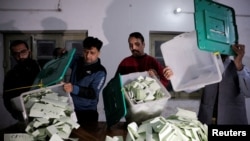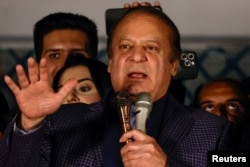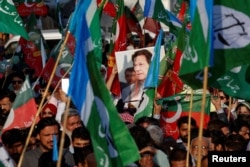A week after Pakistan’s general elections delivered a hung parliament, runners-up are poised to form a coalition government while the winners continue to protest the results. Observers say the election delivered surprises for all stakeholders.
In the February 8 polls, no single party succeeded in winning a simple majority in the National Assembly. The lower house of Pakistan’s bicameral parliament has 266 general seats, with another 70 reserved for women and minorities. A party or coalition needs 169 seats to form a government.
Candidates backed by former Prime Minister Imran Khan’s Tehreek-e-Insaf Party, or PTI, won 93 seats. They were forced to run as independents after the party lost its battle for a unified electoral symbol.
Three-time former Prime Minister Nawaz Sharif’s Pakistan Muslim League (Nawaz), or PMLN, came second with 75 seats. The Pakistan Peoples Party or PPP, led by Asif Zardari and Bilawal Bhutto Zardari, the husband and son of slain Prime Minister Benazir Bhutto, finished third with 54 seats.
With Khan so far refusing to build an alliance with Zardari’s PPP, the latter has agreed to throw his weight behind a coalition government led by PMLN.
As poll results are challenged in courts and coalitions are cobbled together, here are some key takeaways from the South Asian nation’s 12th general elections:
Faith in democracy
Data show that while turnout was almost 48%, about 60.6 million Pakistanis, more than ever before, came out to vote.
Speculation about possible election delays, a slow start to the campaign season, a military-backed crackdown against Khan’s party, and a low level of trust in the electoral process left many questioning whether voters would show up on election day in sizable numbers.
“I think, contrary to predictions that [a] lackluster election campaign would lead to voters being disenchanted and not engaged enough with the political process ... voters did come out in sufficiently large numbers, which showed their faith in the democratic process and their belief that their vote did matter,” former Pakistani diplomat Maleeha Lodhi told VOA.
Political analyst Zahid Hussain called this “a vote for democracy and against repression.”
“I think they [voters] were angry and they wanted to see a change,” he told VOA.
That anger, observers say, was primarily aimed toward the military establishment, which has a history of manipulating Pakistan’s political landscape. Both Sharif and Khan have accused the top brass of forcing them out of office.
"The kind of vote that the PTI-supported candidate got is a message to the establishment that their policies are not acceptable at the common-person level," Hasan Askari Rizvi, a Lahore political analyst, told VOA.
Still, both Rizvi and Hussain said they believed the establishment’s meddling in politics would not end.
“I don’t think the establishment is capable of learning anything different,” Hussain said.
As results came in after a delay of nearly 15 hours amid widespread allegations of rigging, Pakistan’s Army Chief General Asim Munir issued a statement calling on all to “move on from the politics of anarchy and polarization.”
Sharif’s political career
Prior to the election, Sharif was seen as the establishment’s favorite. However, he lost to a PTI-backed candidate in one of two constituencies where he was a candidate, and his win in his stronghold of Lahore against a PTI stalwart was controversial.
Sharif has nominated his younger brother, Shahbaz Sharif, to lead a coalition government in the center and his daughter Maryam Nawaz as the chief minister of Punjab, the largest province.
Sharif’s party rejects any suggestion that not taking a prominent role in the incoming setup means the 74-year-old leader’s political career is over, saying he will lead decision-making.
But Hussain said Sharif was damaged by the election result.
“His political career may not have ended, but his legacy will not survive for a very long time. … His party is completely dependent on the military support,” said Hussain, adding that this election marked the beginning of the decline of Sharif’s party, which now “completely revolves around the Sharif family.”
Lesson for Khan
After losing the vote of no-confidence in 2022, Khan’s party quit parliament instead of sitting on opposition benches. While his street agitation won public support, he failed to force early elections as his rift with the powerful military grew.
“I think the lesson that they [Khan’s party members] have learned is not to walk out of parliament … which may be a good thing. Maybe that begins to moderate the very extreme position that PTI has taken in the past,” said Lodhi, who believes forming the opposition in the next parliament may not be a setback for the party.
“If they are willing to work inside parliament, and they are willing to work as part of the democratic process, I think that might help this party also return to mainstream politics,” Lodhi said.
Stability not in sight
Protests continue across Pakistan, with PTI and several other parties claiming their mandates were stolen.
Pakistan’s interim government has rejected international calls for investigating allegations of rigging, saying the electoral process was a sovereign internal affair.
Caretaker of Information Minister Murtaza Solangi told local media that weather and security issues led to delays in tallying the votes.
In its report, the Free and Fair Election Network, or FAFEN, an Islamabad observer group, said many election officials failed to follow rules or make necessary arrangements to gather results in a timely manner.
More than a dozen people have died in postelection violence.
The newly elected parliament will be sworn in in the next two weeks. The house will then elect its leader, who will serve as the prime minister.
Both Lodhi and Hussain worry that a coalition of runners-up may not bring the political stability that this nation of 241 million people needs to tackle its deepening economic crisis and soaring terrorism threat.
"A minority government with no legitimacy will not survive for a very long time, despite the backing of the establishment,” Hussain said.






